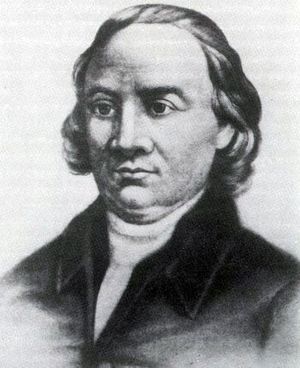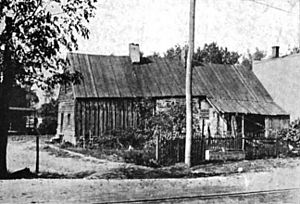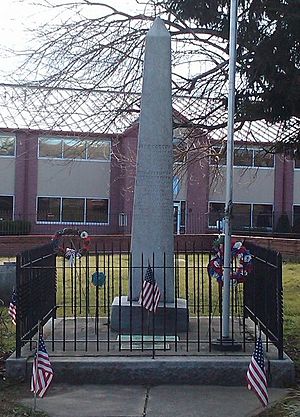John Morton (American politician) facts for kids
John Morton (born 1725 – died 1777) was an important person in early American history. He was a farmer, a surveyor (someone who measures land), and a judge from Pennsylvania. He is known as one of the Founding Fathers because he helped create the United States.
During the American Revolution, he was a delegate (a representative) to the Continental Congress. He signed two very important documents: the Continental Association and the United States Declaration of Independence. John Morton's vote was super important because it helped Pennsylvania decide to support the Declaration of Independence. He also led the group that wrote the Articles of Confederation, which was like the first constitution for the United States.
Contents
Early Life and Background
John Morton was born in 1725 in Ridley Township, which is now in Delaware County, Pennsylvania. His family had roots in Finland. His great-grandfather, Martti Marttinen, came from Finland (which was then part of Sweden) to the Swedish colony of New Sweden in 1654.
John Morton's father, also named John Morton, passed away in 1724, before John was born. When John was about seven years old, his mother, Mary Archer, married John Sketchley. Sketchley was a farmer who helped raise and educate young John Morton.
Political Journey
John Morton began his public service in 1756 when he was chosen to be part of the Pennsylvania Provincial Assembly. The next year, he also became a justice of the peace, a role he held for many years.
Steps Toward Independence
In 1765, Morton was a delegate to the Stamp Act Congress. This was an important meeting where colonists protested unfair taxes from Britain. He left the Assembly in 1766 to work as a sheriff for Chester County. He returned to the Assembly in 1769 and became its speaker in 1775. His career as a judge also grew, and he became an associate justice of the Supreme Court of Pennsylvania in 1774.
Morton was chosen to represent Pennsylvania in the First Continental Congress in 1774 and the Second Continental Congress in 1775. He carefully guided Pennsylvania towards supporting independence.
The Declaration of Independence Vote
In June 1776, when Congress debated declaring independence, the Pennsylvania group was divided. Some, like Benjamin Franklin and James Wilson, wanted independence. Others, like John Dickinson and Robert Morris, did not.
John Morton was undecided until July 1. Then, he chose to side with Franklin and Wilson. When the final vote happened on July 2, Dickinson and Morris did not vote. This allowed Pennsylvania to support the resolution for independence. Morton officially signed the Declaration on August 2, along with most of the other delegates.
Morton also led the committee that wrote the Articles of Confederation. Sadly, he passed away, likely from tuberculosis, before the Articles were officially approved.
Important Legacy
John Morton was the first person who signed the Declaration of Independence to pass away. He was buried in the Old St. Paul's Church Burial Ground in Chester, Pennsylvania. For many years, his grave did not have a marker.
In October 1845, his family members put up an 11-foot marble monument. This monument honors his contributions to the United States.
Monument Inscriptions
The monument has several messages carved into its sides:
- One side says: "Dedicated to the memory of John Morton, A member of the First American Congress from the State of Pennsylvania, Assembled in New York in 1765, and of the next Congress, assembled in Philadelphia in 1774. Born A.D., 1724 - Died April 1777."
- Another side explains his crucial vote: "In voting by States upon the question of the Independence of the American Colonies, there was a tie until the vote of Pennsylvania was given, two members of which voted in the affirmative, and two in the negative. The tie continued until the vote of the last member, John Morton, decided the promulgation of the Glorious Diploma of American Freedom."
- A third side reads: "In 1775, while speaker of the Assembly of Pennsylvania, John Morton was elected a Member of Congress, and in the ever memorable session of 1776, he attended that august body for the last time, establishing his name in the grateful remembrance of the American People by signing the Declaration of Independence."
- The last side shares a powerful message from Morton: "John Morton being censured by his friends for his boldness in giving his casting vote for the Declaration of Independence, his prophetic spirit dictated from his death bed the following message to them: 'Tell them they shall live to see the hour when they shall acknowledge it to have been the most glorious service I ever rendered to my country.'"
In 2013, the University of Turku in Finland opened the John Morton Center for North American Studies. This center was created because there was a need for a national institute to study North America.
Family Life
John Morton married Ann Justis from Chester County. They had eight children together: three sons (Aaron, Sketchley, and John) and five daughters (Mary, Sarah, Lydia, Ann, and Elizabeth). His second son, Sketchley, became a major in the Pennsylvania Militia during the American Revolutionary War. John Morton was also an active member of the Anglican Church in Chester County.
See also
 | Janet Taylor Pickett |
 | Synthia Saint James |
 | Howardena Pindell |
 | Faith Ringgold |




